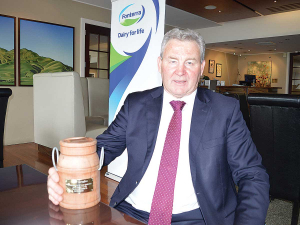Dedoncker Departs Fonterra After Mainland Group Sale
Fonterra executive René Dedoncker is leaving the co-operative later this year to lead Australian agribusiness Elders.
 Former Fonterra chairman John Monaghan with his farewell gift from the Fonterra Shareholder's Council - a wooden cream can carved from a Totara post.
Former Fonterra chairman John Monaghan with his farewell gift from the Fonterra Shareholder's Council - a wooden cream can carved from a Totara post.
Former Fonterra chairman John Monaghan says the co-operative’s capital structure isn’t broken, but needs tweaking to ensure it remains fit for the future.
He told the co-operative’s annual meeting in Masterton that a revised capital structure will help Fonterra execute its strategy successfully.
“The objective of our review is to ensure our capital structure is fit for the future,” says Monaghan who stepped down from the board this month after 12 years.
“We’re not trying to fix something that is broken.”
Monaghan gave shareholders a glimpse into the capital structure review currently being conducted behind closed doors by management and the board.
“We started by identifying what the key elements of a financially sustainable co-op are, and then defined our ‘problems to solve’.
“To address these challenges, we are now looking at a whole range of alternative structures, as well as options within our current structure, and we are thoroughly testing them against the design principles.”
Monaghan hinted that there would be some difficult decisions for shareholders ahead.
“There is no easy answer…every structure involves trade-offs,” he says.
Fonterra’s board and management are expected to take their proposals to farmers soon.
“When we are in a position to do so, we will work with farmers and the Shareholders Council to reach a decision that takes us forward, together,” he says.
Fonterra’s new strategy, unveiled last year after two consecutive years of losses, focuses on three goals – healthy people, healthy environment and healthy business.
It also focuses on New Zealand milk, rather than setting up milk pools overseas.
Monaghan noted that there was still a high level of uncertainty as to how the global recession and new waves of Covid-19 will impact demand for dairy globally.
He believes the best way of coping with uncertainty is to stay on strategy and to focus on what is within the co-op’s control.
“We were match fit when Covid struck, with a new strategy, structure, and culture. That has us well positioned to come out the other side where there will be new opportunities,” he says.
Monaghan says he remains very optimistic about the future of the industry and Fonterra.
“Roughly six billion people around the world rely on dairy products as one of their most important sources of protein and energy. We’re not out to feed the whole planet; the point here is that the opportunity for us is significant.
“People will always pay for quality, and we produce what I believe is the best milk in the world.
“Our continued success will rely on our ability to balance sustainable economic returns with the continued regeneration of our environment. I firmly believe that through a strong co-op we can achieve both.”
Former Fonterra executive Alex Turnbull has been appointed CEO to lead all five Yili Oceania Business Division companies in New Zealand.
Fonterra executive René Dedoncker is leaving the co-operative later this year to lead Australian agribusiness Elders.
Alliance Group and the Southland Stags rugby team have joined forces in a partnership that will see the the meat co-operative's farmgate brand feature on players' team kits and replica jerseys.
Fonterra's plan to expand its organic programme to the South Island is being well received by farmers, the co-op says.
Voting has started for the renewal of DairyNZ's milksolids levy.
The most successful catchment groups in NZ are those that have 'a source to sea' approach.

OPINION: Here w go: the election date is set for November 7 and the politicians are out of the gate…
OPINION: ECan data was released a few days ago showing Canterbury farmers have made “giant strides on environmental performance”.